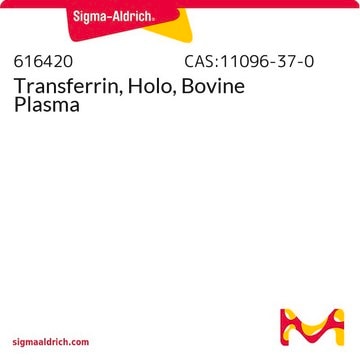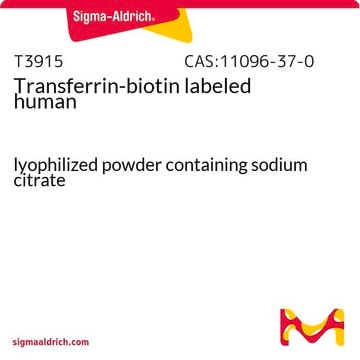Recommended Products
biological source
bovine
Quality Level
Assay
≥98%
form
powder
technique(s)
cell culture | mammalian: suitable
solubility
H2O: 20 mg/mL
UniProt accession no.
storage temp.
2-8°C
Gene Information
bovine ... TF(280705)
Looking for similar products? Visit Product Comparison Guide
Application
All cells require iron for the proper uptake of oxygen from their environment. Transferrin, a protein isolated from serum, causes the uptake and transport of iron from culture medium to the cells. This allows proper oxygen uptake and also stimulates growth-related enzyme activity. Iron-saturated transferrin (holo transferrin) is continually recycled after releasing iron and becomes iron-deficient transferrin (apo-transferrin). Choosing which form to use depends upon the culture conditions. In media such as Dulbecco′s Modified Eagle′s Medium/Ham′s Nutrient Mixture F12 (DMEM/F12) that contain high levels of iron salt, using apo-transferrin is preferred.
Storage Class Code
11 - Combustible Solids
WGK
WGK 3
Flash Point(F)
Not applicable
Flash Point(C)
Not applicable
Personal Protective Equipment
dust mask type N95 (US), Eyeshields, Gloves
Certificates of Analysis (COA)
Search for Certificates of Analysis (COA) by entering the products Lot/Batch Number. Lot and Batch Numbers can be found on a product’s label following the words ‘Lot’ or ‘Batch’.
Already Own This Product?
Find documentation for the products that you have recently purchased in the Document Library.
Customers Also Viewed
Sandeep Kumar et al.
The journal of physical chemistry. B, 121(37), 8669-8683 (2017-08-25)
The macromolecular crowding influences the structural stability and functional properties of transferrin (Tf). The equilibrium as well as kinetic studies of Tf at different concentrations of crowding agents (dextran 40, dextran 70, and ficoll 70) and at a fixed concentration
Pablo Di Giusto et al.
Cells, 11(8) (2022-04-24)
The transcription factor CREB3L1 is expressed in a wide variety of tissues including cartilage, pancreas, and bone. It is located in the endoplasmic reticulum and upon stimulation is transported to the Golgi where is proteolytically cleaved. Then, the N-terminal domain
Elisabeth Wyart et al.
EMBO reports, 23(4), e53746-e53746 (2022-02-25)
Cachexia is a wasting syndrome characterized by devastating skeletal muscle atrophy that dramatically increases mortality in various diseases, most notably in cancer patients with a penetrance of up to 80%. Knowledge regarding the mechanism of cancer-induced cachexia remains very scarce
J L Hayworth et al.
Clinical and experimental immunology, 157(1), 60-70 (2009-08-08)
Staphylococcal enterotoxin B (SEB) is a pyrogenic exotoxin and a potent superantigen which causes massive T cell activation and cytokine secretion, leading to profound immunosuppression and morbidity. The inhibition of SEB-induced responses is thus considered a goal in the management
Min Lin et al.
The Journal of neuroscience : the official journal of the Society for Neuroscience, 36(40), 10376-10391 (2016-10-07)
Methamphetamine (METH) is a substrate for the dopamine transporter that increases extracellular dopamine levels by competing with dopamine uptake and increasing reverse transport of dopamine via the transporter. METH has also been shown to alter the excitability of dopamine neurons.
Our team of scientists has experience in all areas of research including Life Science, Material Science, Chemical Synthesis, Chromatography, Analytical and many others.
Contact Technical Service














